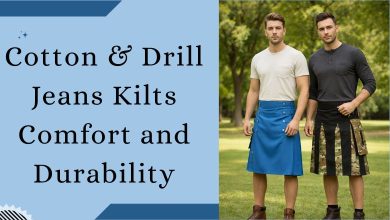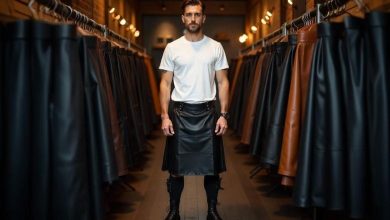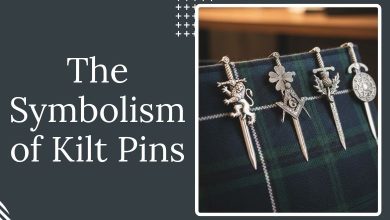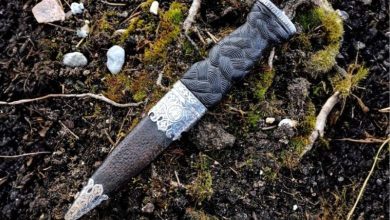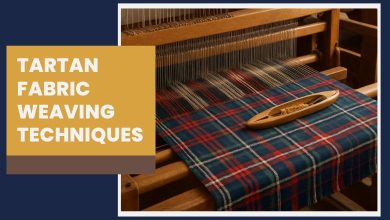Material Options for Kilt Shirts for Comfort and Style
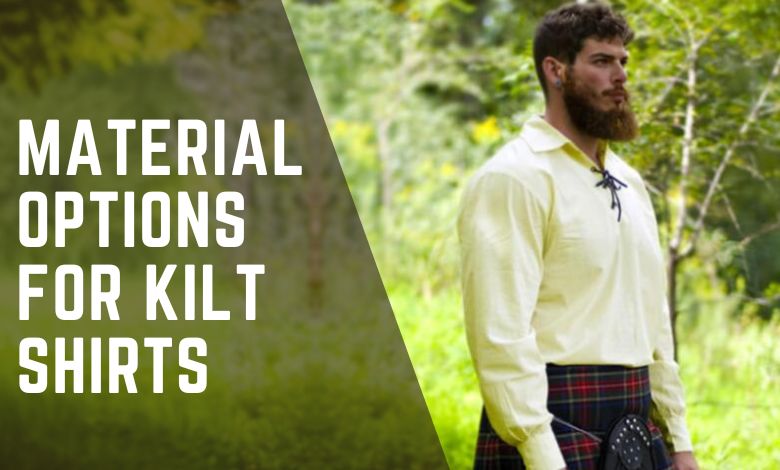
How you feel and appear may be greatly impacted by the shirt you choose to wear with your kilt. Some fabrics seem elegant and maintain warmth, while others are cold and soft. This article will discuss the most common materials for kilt shirts, including cotton, linen, wool, and more. You will discover what is most effective for various occasions, times of year, and comfort requirements. With the aid of this advice, you can choose the ideal shirt for a casual day or a party!
Table of Contents
ToggleKilt Shirts and Their Types
Undoubtedly, the material of a kilt shirt matters and plays a specific role everywhere. But an important point right now is to understand a kilt shirt first and what types it has. Many modern shirts like T-shirts and polo shirts are worn today with kilts but the traditional ones are called Ghillie or Jacobite shirts. These shirts are a bit different from standard ones as they do not have buttons while a neckline with laces replaces buttons. These shirts are loose and made with breathable fabrics to maintain comfort. Therefore, some other kilt shirt types are:
| Ghillie/Jacobite Shirts | Standard Collar Dress Shirt |
| Plain white shirts | Wing Collar Shirt |
| Polo Shirts | Casual Down-button Shirt |
| T-shirts | Marcella Shirt |
What Materials Are Used in Kilt Shirts?
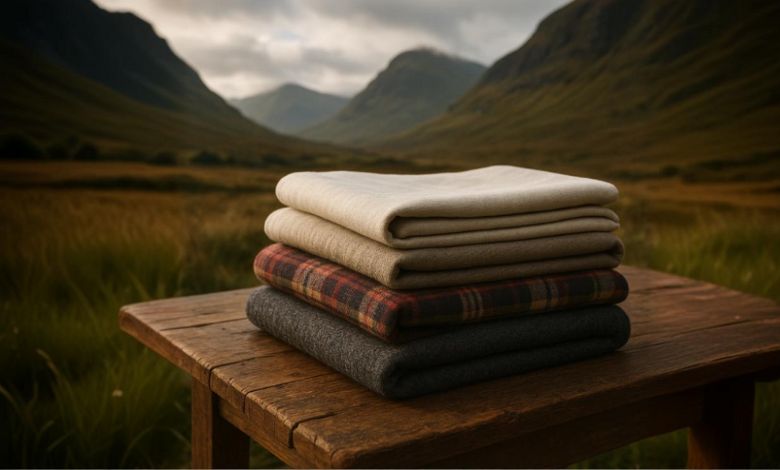
Here comes the moment to dive into our primary topic which discusses the materials that make kilt shirts. Remember, all the men’s kilts are meant to be comfortable and so is the criteria with shirts. There are different fabrics that fulfill this requirement like cotton, linen, wool, etc. We shortlisted 5 most common materials that are used in entire Scottish communities.
Cotton
The first and a reliable fabric material used to make kilt shirts is cotton. It is the material that Scots traditionally used to make Ghillie shirts. The comfort and exceptional breathability of cotton confirm the fulfillment of comfort. Cotton still leads the kilt shirt domain even after centuries
Linen
The most prominent competitor of cotton to make kilt shirts is linen. Also being a traditional fabric, linen offers a high level of comfort, breathability, and above all moisture-wicking properties. This fabric is a bit costlier than cotton because it is labor-intensive to produce. However, people still prefer linen-made shirts to pair with their kilts.
Polyester and Synthetic Blends
Polyester is not a natural fabric but a human-made alternative to it. Therefore, the naked eye may not recognize it easily. Polyester and synthetic blends are used to make kilt shirts for those who cannot afford costlier ones. These fabrics are durable as well as comfortable but their affordability is the major feature making it popular among the Scots.
Flannel
Frequently used in plaid or tartan designs, which are popular on kilt shirts, flannel is a smooth, woven fabric that may be brushed for further softness. Consequently, flannel is not just for kilt shirts; it is a fabric that can be used for a wide range of clothing, such as shirts, sweaters, vests, cardigans, and even home goods like blankets and bed linens.
Wool and Wool Blends
Like cotton and linen, wool is also one of the most traditional and popular options to make kilt shirts. Scots consider it an essential fabric. Made using twill-weave techniques, it offers breathability, warmth, and longevity. The fiber’s inherent strength and durability make it ideal for withstanding wear and tear in various conditions. Moreover, wool keeps the user warm in colder climates because it is a great insulator.
Material Comparison Table
| Fabric | Comfort | Breathability | Durability | Cost | Moisture-Wicking |
| Cotton | High | Excellent | Moderate | Affordable | Moderate |
| Linen | High | Excellent | Moderate | High | Excellent |
| Polyester/ Synthetic Materials | Moderate | Moderate | High | Low | Low to Moderate |
Comfort Factors in Depth
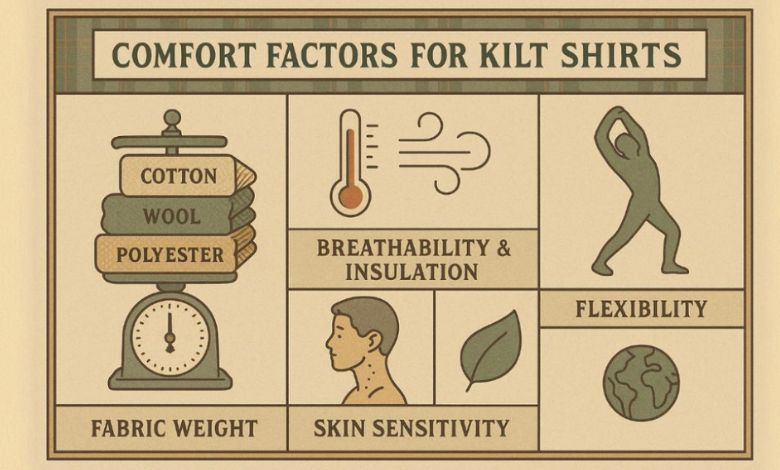
No matter what kilt shirt material you prefer, the most important consideration is staying comfortable in it. So, there are a few things that you must keep in mind or follow while finalizing one.
Fabric Weight Affects Comfort
Many people may devalue this point but knowing the weight of fabric is the most valuable practice. Weight highly impacts your comfort experience in both summer and winter seasons. Paying attention to fabric weight ensures you stay comfortable in any season.
Breathability and Insulation
Breathability and heat insulation traits of a shirt fabric are what ensure a great depth of comfort around the year. So, choose fabric according to the season. Wool performs a wonderful duty as a breathable material which means it is good for summer. On the other hand, linen and wool are natural insulators of heat providing their suitability for winter.
Flexibility in Shirt Fabrics
Do not underestimate the flexibility of a fabric. Imagine participating in Highland games, especially in Hammer Throw where stretching is the primary requirement. Many activities, such as Highland games, demonstrate the importance of wearing flexible fabric for ease of movement. Cotton and polyesters are highly valuable in offering flexibility.
Skin Sensitivity and Allergies
Some people are allergic to specific fabrics. It’s important to understand both your skin’s sensitivity and the properties of the fabric. Regarding the ones discussed above, polyester registers its name on the list of skin-sensitive fabrics. Similarly, there are many other fabrics like spandex, which is known to be the most stretchable fabric, and is prone to cause allergies.
Environmental Considerations
There are many things that you should consider while buying a kilt shirt such as quality, fit, brand’s value, etc. Environmental impact is another key factor to consider when choosing a kilt shirt. According to reports, 66% of people are ready to pay extra to get sustainable products. So, one must value this aspect.
Traditional kilt shirts are made with biodegradable fabrics like cotton, linen, and wool. However, synthetic fabrics are generally less environmentally friendly. In short, environmental considerations must be part of your thoughts while choosing kilt shirt material.
Choosing the Right Shirt Material for Your Occasion
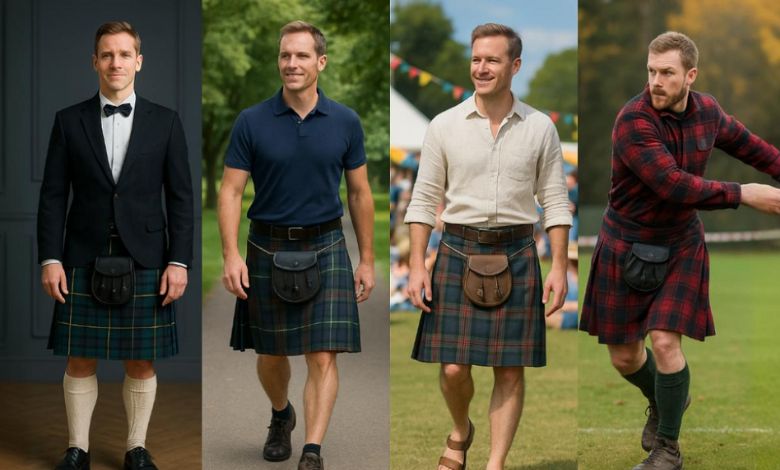
Another point we must not miss discussing here is choosing the right shirt material according to the event’s theme. No single fabric performs well in all weather conditions or event types. So, one must choose a shirt carefully.
Formal Events: Go with high-quality materials like crisp cotton or a refined wool blend paired with a wing collar or Marcella shirt for formal events. These fabrics are popular to provide a polished appearance. Moreover, they pair well with formal kilts and accessories.
Casual and Everyday Wear: To ensure maximum comfort, cotton, polyester blends, or polo shirts might be the ideal ones. The reasons are straightforward: they are comfortable, easy to maintain, and affordable. In addition, these shirts allow for relaxed movement and work well for informal gatherings or daily errands.
Seasonal Recommendations: Linen and lightweight cotton are perfect for summer due to their breathability and moisture-wicking properties. In contrast, wool, flannel, or heavier cotton shirts offer insulation for colder months, keeping you warm and stylish.
Outdoor Events and Festivals: Though you have to remain outside the home, opt for durable and breathable materials like flannel, wool blends, or flexible cotton. Besides being comfortable, they offer resilience and freedom of movement throughout long hours.
Where to Buy Quality Kilt Shirts by Material
Buying all of these shirts is quite challenging at the same store. All stores may not provide you with traditional kilt shirts, so it’s important to purchase from one that has a good reputation in this domain. A considerable recommendation here is The Utility Kilt, an online brand. We think about everyone; that’s why all our products including traditional kilt shirts, kilts, and accessories are available at budget-friendly prices. Along with prices, we excellently customize all the kilt products. We also have trouble-free return and exchange policies if you receive a faulty product!
FAQs About Kilt Shirt Materials
How do I know if a kilt shirt fabric will be breathable enough for summer events?
What’s the difference between a casual and a formal kilt shirt fabric?
Do heavier fabrics affect the mobility needed when wearing a kilt?
Can a kilt shirt fabric affect the overall formality of the outfit?
The overall formality of a kilt ensemble is greatly influenced by the fabric of the shirt. While heavier, more structured textiles like wool are usually used for formal events. Therefore lighter, looser fabrics like cotton or linen are often more informal occasions.
